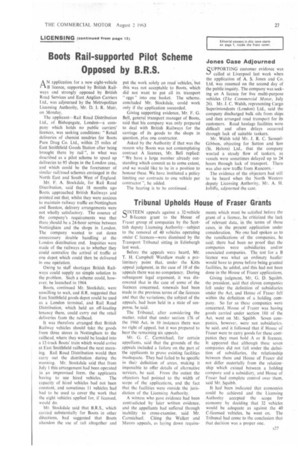Boots Rail-supported Pilot Scheme Opposed by B.R.S.
Page 29

If you've noticed an error in this article please click here to report it so we can fix it.
A N application for a new eight-vehicle
B licence, supported by British Railways and strongly opposed by British Road Services and East Anglian Carriers Ltd., was adjourned by the Metropolitan Licensing Authority, Mr. D. I. R. Muir, on Monday.
The applicant--Rail Road Distribution Ltd., of Bishopsgate, London—a company which holds no public carriers' licences, was seeking conditions: " Retail deliveries of chemist sundries for Boots Pure Drug Co. Ltd., within 25 miles of East Smithfield Goods Station after being brought there by rail ", in what was described as a pilot scheme to speed up deliveries to 95 shops in the London area, and which could be the forerunner of similar rail/road schemes envisaged in the North East and South West of England.
Mr. F. A. Stockdale, for Rail Road Distribution, said that 18 months ago Boots approached British Railways and pointed out that, whilst they were anxious to maintain railway traffic ex-Nottingham and Beeston, delivery arrangements were not wholly satisfactory. The essence of the company's requirements was that there should be a 24-hour service between Nottingham and the shops in London. The company wanted to cut downunnecessary double handling at the London distribution end. Inquiries were made of the railways as to whether they could centralize the arrival of traffic at one depot which could then be delivered in one operation.
Owing to staff shortages British Railways could supply no simple solution to the problem. Such a scheme could, however, be launched in 1964.
Boots, continued Mr. Stockdale, were unwilling to wait, and B.R. suggested that East Smithfield goods depot could be used as a London terminal, and Rail Road Distribution, which held an off-loading tenancy there, could carry out the retail • deliveries from the railhead.
It was therefore arranged that British Railway vehicles should take the goods from three stores in Nottingham to the railhead, where they would be loaded into a 12-truck Boots' train which would arrive at East Smithfield railhead the next morning. Rail Road Distribution would then carry out the distribution during the morning. Mr. Stockdale said that from July I this arrangement had been operated in an improvised form, the applicants having to use hired vehicles. The capacity of hired vehicles had not been constant, and sometimes 11 vehicles had had to be used to cover the work that the eight vehicles applied for, if licensed, would do.
Mr. Stockdale said that B.R.S.. which carried substantially for Boots in other directions, had suggested that Boots abandon the use of rail altogether and put the work solely on road vehicles, but this was not acceptable to Boots, which did not want to put all its transport " eggs into one basket. The scheme. concluded Mr. Stockdale, could work only if the application succeeded.
Giving supporting evidence, Mr. F. G. Bell, general transport manager of Boots, said that his company was only prepared to deal with British Railways for the carriage of its goods to the shops in question. plus one contractor.
Asked by the Authority if that was the reason why Boots was not contemplating contract A licences, Mr. Bell replied: "We have a large number already outstanding which commit us to some extent, and we would like to be in a position to honour these. We have instituted a policy limiting our contracts to one vehicle per contractor ", he added, The hearing is to be continued.




























































































